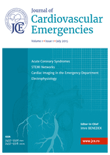
Journal of Cardiovascular Emergencies
Scope & Guideline
Fostering global collaboration in the fight against cardiovascular emergencies.
Introduction
Aims and Scopes
- Cardiovascular Risk Assessment:
Research on biomarkers and ratios, such as the Neutrophil-to-Lymphocyte Ratio and other hematological parameters, to evaluate the risk of major cardiovascular events and aid in prognosis. - Emergency Management of Cardiovascular Conditions:
Case studies and reviews focusing on the timely diagnosis and management strategies for acute cardiovascular conditions such as myocardial infarction, heart failure, and arrhythmias. - Technological Innovations in Cardiology:
Exploration of new technologies and methodologies, including artificial intelligence and advanced imaging techniques, for improving diagnosis and treatment in emergency settings. - Inflammation and Cardiovascular Health:
Investigation into the role of inflammation in cardiovascular diseases, including its implications for acute presentations and outcomes. - Pediatric and Neonatal Cardiovascular Emergencies:
A niche focus on the unique challenges and management strategies in pediatric and neonatal cases of cardiovascular emergencies.
Trending and Emerging
- Impact of COVID-19 on Cardiovascular Health:
An increasing number of studies are examining the relationship between COVID-19 and cardiovascular events, showcasing the pandemic's ongoing relevance to cardiovascular emergencies. - Role of Inflammation in Acute Events:
Research focusing on inflammation as a critical factor in acute cardiovascular events is on the rise, indicating a shift towards understanding the underlying pathophysiology of these emergencies. - Artificial Intelligence in Cardiovascular Diagnosis:
There is a growing interest in the applications of artificial intelligence and machine learning for improving diagnosis and treatment in emergency cardiology, reflecting technological advancement in the field. - Pediatric Cardiovascular Emergencies:
Emerging themes in the management of cardiovascular emergencies in pediatric populations are gaining attention, addressing the unique needs and challenges of this demographic. - Multimodality Imaging Techniques:
An increasing emphasis on the use of multimodality imaging techniques for assessing and managing cardiovascular emergencies is evident, highlighting advancements in diagnostic capabilities.
Declining or Waning
- Traditional Risk Factors for Cardiovascular Disease:
There is a noticeable decrease in publications centered around traditional risk factors like hypertension and hyperlipidemia, as newer markers and ratios gain prominence in cardiovascular risk assessment. - Generalized Case Reports:
The journal has gradually moved away from generic case reports without significant novel insights, focusing more on unique cases or those that present new challenges in emergency settings. - Longitudinal Studies on Chronic Conditions:
Research related to chronic cardiovascular conditions appears to be waning, as the journal increasingly prioritizes acute events and immediate interventions over long-term management studies.
Similar Journals
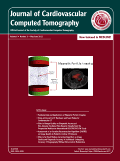
Journal of Cardiovascular Computed Tomography
Leading the way in cardiovascular computed tomography insights.The Journal of Cardiovascular Computed Tomography, published by Elsevier Science Inc, is a premier international journal dedicated to the field of cardiovascular imaging and technology. With a strong impact factor, it serves as a pivotal platform for disseminating cutting-edge research and advancements from 2007 to 2024, specifically within the realms of cardiology and radiology. The journal holds a distinguished Q1 ranking in both Cardiology and Cardiovascular Medicine and Radiology, Nuclear Medicine and Imaging, reflecting its influential role in shaping clinical and academic discourse in these fields. Notably, the journal boasts impressive Scopus rankings, placing it in the top decile of its categories, highlighting its high-quality publications and significant contribution to the scientific community. Although it does not operate under an open access model, it ensures robust accessibility for researchers, professionals, and students eager to stay informed about the latest innovations and studies in cardiovascular computed tomography. The Journal of Cardiovascular Computed Tomography is essential for anyone involved in cardiovascular research, offering valuable insights and fostering collaborations across disciplines.

CANADIAN JOURNAL OF CARDIOLOGY
Transforming Cardiology with High-Impact ResearchCanadian Journal of Cardiology (ISSN: 0828-282X, E-ISSN: 1916-7075), published by Elsevier Science Inc, serves as a vital platform for disseminating high-quality research in the dynamic field of cardiology and cardiovascular medicine. Since its inception in 1985, this journal has established itself as a leader in the field, currently holding a prestigious Q1 ranking in Cardiology, indicating its significant impact and contribution to medical science. With a Scopus rank of #50 out of 387 in its category and placing in the 87th percentile, the journal showcases rigorous peer-reviewed articles that advance knowledge and practice in cardiology. Although the journal is not open access, it provides valuable insights and research findings that cater to clinicians, researchers, and students who are committed to improving cardiovascular health. As we approach the convergence of years to 2024, the Canadian Journal of Cardiology continues to strive for excellence, facilitating a discourse vital for both academic and clinical advancements in cardiology.
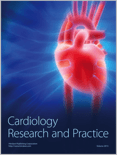
Cardiology Research and Practice
Exploring breakthroughs in heart health and treatment.Cardiology Research and Practice is a leading academic journal dedicated to advancing knowledge in the fields of cardiology and cardiovascular medicine. Published by HINDAWI LTD, this journal has been an inclusive platform for open access research since 2009, facilitating the dissemination of high-quality studies that contribute to the global scientific community. With an impact factor placing it in Q2 of its category in 2023, it underscores its importance in delivering innovative insights and discoveries that shape clinical practices and policies. The journal covers a broad scope of topics including, but not limited to, cardiovascular disease prevention, innovative treatment modalities, and emerging technologies, appealing to researchers, healthcare professionals, and students alike. Located in the United States with its international reach, Cardiology Research and Practice serves as a critical resource for those dedicated to improving patient outcomes and advancing the field of cardiology.
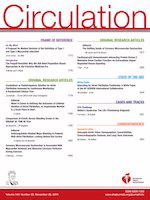
CIRCULATION
Pioneering Research for a Healthier Heart.CIRCULATION is a premier journal in the field of cardiology and cardiovascular medicine, published by Lippincott Williams & Wilkins. With a distinguished history dating back to 1950, the journal has consistently been at the forefront of critical research, showcasing significant advancements and discoveries in cardiovascular health. It holds a remarkable Q1 ranking in both the fields of Cardiology and Physiology (medical) according to the 2023 category quartiles, demonstrating its influential role among the top publications in these disciplines. With an impressive Scopus ranking, placed 3rd out of 387 in Cardiology and 2nd out of 113 in Physiology, CIRCULATION is essential reading for researchers, practitioners, and students passionate about advancing their understanding of heart health and related medical sciences. Although the journal is not open access, it continues to foster scholarly exchange and innovation in cardiovascular research, making it an indispensable resource for quality insights and groundbreaking studies.

CIRCULATION RESEARCH
Pioneering discoveries in cardiology and physiology.CIRCULATION RESEARCH is a premier journal dedicated to advancing the field of cardiovascular science, focusing on innovative research in cardiology and physiology. Published by Lippincott Williams & Wilkins, this esteemed journal has been a cornerstone of cardiovascular research since its inception in 1953, maintaining rigorous standards of scholarly excellence. With an impressive impact factor and ranking in the top quartiles for both Cardiology and Cardiovascular Medicine (Q1) and Physiology (Q1), it holds a significant position in the Scopus database. This journal features cutting-edge studies aimed at understanding the mechanisms of cardiovascular health and disease, promoting the translation of research into clinical practice. Weekly issues provide practitioners and researchers alike with vital insights to keep abreast of the latest developments. Although it does not offer open access, CIRCULATION RESEARCH remains vital for professionals striving to enhance their knowledge and impact in the ever-evolving landscape of cardiovascular medicine.

Frontiers in Emergency Medicine
Fostering collaboration in the field of emergency healthcare.Frontiers in Emergency Medicine, published by Tehran University of Medical Sciences, stands as an essential open-access platform dedicated to advancing research and practice in the diverse fields of emergency medicine, nursing, and medical services. With a focus on publishing high-quality studies that address the emerging challenges in prehospital and emergency care settings, this journal has rapidly gained recognition since its inception in 2021. The journal's current Scopus rankings place it favorably within the top quartiles for emergency medical services and emergency nursing, making it a valuable resource for researchers and practitioners aiming to enhance patient care and operational efficiency in emergency contexts. The journal encourages submissions that explore innovative practices, clinical outcomes, and policy developments in emergency medicine, promising accessibility and visibility for authors through its open-access model. Located in Iran, Frontiers in Emergency Medicine not only serves the regional community but also aspires to impact the global discourse in emergency healthcare.
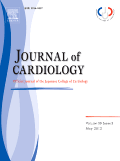
Journal of Cardiology
Driving breakthroughs in heart health and patient care.Journal of Cardiology, published by ELSEVIER, stands as a prominent resource in the field of cardiology and cardiovascular medicine. With a rich history since its inception in 1987, this peer-reviewed journal aims to disseminate cutting-edge research that enhances the understanding and treatment of cardiovascular diseases. Its 2023 ranking places it in the Q2 category within its discipline, reflecting its significance and impact, as evidenced by a Scopus rank of #123 out of 387 journals, positioning it in the 68th percentile of its field. The journal is headquartered in Japan, providing a unique perspective on cardiological advances relevant not only to the Asian continent but also globally. Though it does not currently offer open access, the Journal of Cardiology remains a vital institutional resource for researchers, clinicians, and students seeking to push the boundaries of cardiovascular science and improve patient outcomes.

American Journal of Cardiovascular Drugs
Advancing Knowledge in Heart HealthAmerican Journal of Cardiovascular Drugs, published by ADIS INT LTD, is a premier peer-reviewed journal dedicated to the field of cardiology and cardiovascular medicine. With an ISSN of 1175-3277 and an E-ISSN of 1179-187X, this esteemed journal has established itself as a crucial platform for disseminating high-quality research since its inception in 2001. It holds a significant position in its domain, ranking in the second quartile (Q2) across several categories including Cardiology, Medicine (miscellaneous), and Pharmacology (medical) for the year 2023. With its Scopus ranks placing it in the 81st percentile for Cardiology and 77th percentile for Pharmacology, the journal is highly regarded among professionals, researchers, and students alike. While it is not an open-access journal, its comprehensive articles and systematic reviews provide an in-depth exploration of cardiovascular drug therapy, therapeutic advancements, and clinical practices, making it an invaluable resource for anyone invested in the future of cardiovascular health.
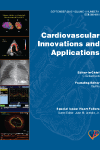
Cardiovascular Innovations and Applications
Innovating today for the cardiology breakthroughs of tomorrow.Cardiovascular Innovations and Applications is a premier open-access journal dedicated to advancing knowledge in the field of cardiovascular medicine. Published by COMPUSCRIPT since 2016, this journal provides a platform for the dissemination of innovative research and applications that address crucial topics in cardiology, aiming to bridge the gap between clinical practice and cutting-edge research. With an ISSN of 2009-8618 and an E-ISSN of 2009-8782, it operates on a global scale, facilitating access to high-quality content without financial barriers. The journal is positioned within the Medicine - Cardiology and Cardiovascular Medicine category, and its current Scopus rank of #321/387 reflects its potential for growth and influence in the academic community, being in the 17th percentile. Researchers, healthcare professionals, and students will find Cardiovascular Innovations and Applications an invaluable resource in their quest for the latest findings and advancements in cardiovascular health and treatment methodologies.
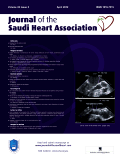
Journal of the Saudi Heart Association
Advancing Cardiovascular Knowledge for a Healthier TomorrowThe Journal of the Saudi Heart Association is a prominent scholarly publication dedicated to advancing knowledge in the fields of cardiology and cardiovascular medicine. Published by DIGITAL COMMONS BEPRESS, this open-access journal has been serving the global community since 2009, providing a vital platform for researchers, practitioners, and students interested in the latest developments in heart health and disease management. With an ISSN of 1016-7315 and a growing repository of knowledge alongside an E-ISSN of 2212-5043, the journal showcases an array of peer-reviewed articles that contribute to the understanding of cardiovascular conditions. Although categorized in the Q4 quartile for 2023, it remains committed to offering valuable insights, particularly within the constraints of the 29th percentile rank specified by Scopus. As the journal converges towards 2024, it continues to foster collaboration, innovation, and inquiry within the Saudi Arabian and international medical communities.